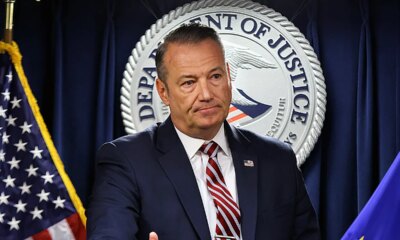Connecticut
August 2 Update From Easton First Selectman Bindelglass

**News Release Submitted by Easton First Selectman Bindelglass**
Aug. 2, 2024
Good afternoon,
Find out what’s happening in Weston-Redding-Eastonwith free, real-time updates from Patch.
The Connecticut Secretary of State has designated Tuesday, August 13th for the Republican Primary for candidates vying for Republican endorsements for positions on the November ballot. Republicans Michael Goldstein and Bob MacGuffie, each seek to oppose the endorsed Democrat candidate, incumbent, Rep. Jim Himes for the 4th District Congressional seat. Republicans, Matthew Corey and Gerry Smith are each seeking the Senatorial seat occupied by the Democrat-endorsed candidate, incumbent, Senator Chris Murphy.
The Republican Primary will be preceded by seven (7) days of early voting from August 5th through August 11th and held at the Easton Library Community Room. Hours for Early Voting are Monday, Wednesday, Friday, Saturday, and Sunday, from 10:00 am to 6:00 pm. Hours on Tuesday, August 6th, and Thursday, August 8th, will be from 8:00 am to 8:00 pm daily.
Find out what’s happening in Weston-Redding-Eastonwith free, real-time updates from Patch.
For those Republicans who either haven’t voted early or by absentee ballot, Primary Day, is Tuesday, August 13th, and voting will be held in the Cafetorium at Samuel Staples Elementary School, from 6:00 am to 8:00 pm.
As a final note, remember, in Connecticut, only registered Republicans are eligible to vote in the August Primary, in person, by Early Vote, or by Absentee Ballot. For more information please visit the Town website at: https://www.eastonct.gov/town-clerk/pages/8-13-2024-republican-primary-i….
Also, August 1st was national poll worker recruiting day. It is critical that we have an ample supply of workers for our voter polling places both for early voting and election day. Please consider volunteering to work at the polls. For more information please reach out to the registrar of voters at (203) 268-6291 or voters@eastonct.gov.
Connecticut Blood Center, a not-for-profit, independent, community blood center, provides over 65,000 units of blood to over a dozen Connecticut hospitals annually. The Hartford HealthCare network, including the local St. Vincent’s Medical Center, receives all of its life-saving red cells, platelets and plasma blood for patients in need from the Connecticut Blood Center. For more information, visit ctblood.org.
BLOOD EMERGENCY: From July 22nd – August 12th, the Connecticut Blood Center will be in a blood emergency with a low supply of blood for Connecticut hospitals. Due to the challenges around blood collections during the summer months, there is an URGENT NEED for more blood donations!
Save the date for an exciting day at the Easton Senior Center auction on September 18, 11:00 am – 2:15 pm. Preview auction items on Monday, September 16 from 10:00 am – 2:00 pm. Enjoy snacks and beverages before the auction. Enter for a separate raffle ($5 for 10 tickets) to be drawn at the auction. Rare and vintage items selling online for big dollars are being offered at a huge discount. Find your treasure to add to your collection or profit from your finds. Thrown into this mix are gift certificates from local businesses/residents, delicious homemade goodies, a professional photography offer, and local resident art. Don’t miss – mark your calendars!
Blood Pressure Screening will be provided by the Easton EMS every second Wednesday of the month at 10:00 am at the Easton Senior Center.
Next week the Municipal Agent, Daniel Simonelli, will be hosting a Health and Information Fair at the Easton Senior Center. There will be many great providers such as Avangrid (UI, SCG), Home Health Care providers, Mozaic Senior Living, Aspetuck Health District, Alzheimer’s Association, and more! This is a great way to speak to some of the providers you already use, or may want to use in the future. Looking forward to seeing you there! No sign-up is necessary, feel free to drop by at any point on August 7th between 11:00 am and 1:30 pm to gather information from all of these great providers!
Mark A.R. Cooper, Director of Health for the Aspetuck Health District stated today that West Nile Virus has now been found in mosquitoes trapped in Westport. This comes as no surprise as other area towns have already found mosquitoes carrying the virus in the past few weeks. With warm and wet weather conditions, which are favorable for breeding mosquitoes, and with plenty of time before the first frost that ends the mosquito season locally, there is concern that the number of infected mosquitoes will continue to increase, increasing the potential for human exposure. Mr. Cooper stated that “there is no reason to panic, but precautions should be exercised to avoid being bitten by mosquitoes.”
Mosquitoes will deposit their eggs in any pool of water they can find and will be eagerly looking for blood to feed on once they mature and begin to fly. The mosquitoes testing positive were Culex pipens mosquitoes the predominately feed on bird hosts, but given the opportunity, will feed on humans. No human cases of West Nile Virus have been identified yet in Connecticut.
The Health District recommends residents take the following precautions:
- Eliminate any object outside that can hold water and become a breeding place for mosquitoes.
- Clean house gutters that may be retaining water.
- Empty wading pools and bird baths every few days.
- Chlorinate swimming pools regularly.
- Make sure the covers that are on grills, boats, pools, and other equipment do not collect water.
- Also, be sure door and window screens are tight fitting and in good repair to avoid mosquito bites when indoors.
Tips for avoiding mosquito bites when outdoors:
Mosquitoes require a blood meal for reproduction. The following are measures that can help reduce bites from mosquitoes that feed on people:
- Be particularly careful at dusk and dawn when mosquitoes are most active.
- Wear shoes, socks, long pants, and long-sleeved shirts. Clothing material should be tightly woven.
- Use mosquito netting when sleeping outdoors.
- Consider the use of CDC- recommended mosquito repellents, containing DEET, picaridin, oil of lemon eucalyptus, IR3535, or 2-undecanone, and apply according to directions, when it is necessary to be outdoors.
- When using DEET, use the lowest concentration effective for the time spent outdoors (for example, 6 percent lasts approximately two hours and 20 percent for four hours) and wash treated skin when returning indoors. Do not apply under clothing, to wounds or irritated skin, the hands of children, or to infants less than two months old.
For more information on West Nile Virus, visit the Health District’s Web site at www.aspetuckhd.org and/or the Connecticut Mosquito Management Program Web site at www.ct.gov/mosquito.
Last night at the Board of Selectman meeting we discussed potential changes to the Planning and Zoning ordinance which would allow for the commission to become an elected board. There was also a lengthy discussion about a filing that I made in November 2023, with the Freedom of Information Commission. State statutes allow for towns and organizations to petition to have certain individuals limited in their ability to make requests under the Freedom of Information Act because they are thought to be abusing the process with the intent of obstructing or disrupting the work of the town. A favorable ruling to the town in no way affects the release of any information. Only the activities of the individual.
I took this action by myself as the First Selectman because I felt that the function of the town hall was being affected. Ultimately, the services that we provide to our citizens, and which your tax dollars fund, were being compromised and I felt the need to take this action to protect the town. Unfortunately, the Freedom of Information Commission has decided not to consider the request. My petition and their response are listed below.
Have a great weekend.
Dave
November 8, 2023
Freedom of Information Commission Sent electronically
165 Capitol Avenue, Suite 1100
Hartford, CT 06106
To Whom It May Concern:
As First Selectman of the Town of Easton, I am requesting relief from a requester that the Town
of Easton alleges is a vexatious requester, under the provisions of section 1-206. Specifically, I
am asking for a review by the Executive Director, with ultimate review by the commission.
Between August 28, and October 5, we have received 7 FOI requests from a single individual six
of which were received between October 2 and October 5 (attached). All are loosely related to
a single property which the requester has been trying to attack for several months for what she
believes is building and zoning violations. They involve multiple departments in Easton Town
Hall. The last is a request for copies of checks for permit payments and their posting dates and
to which accounts. Our Director of Finance finds this to be an extremely onerous request.
This individual has on multiple occasions viewed the building and planning and zoning files for
this property which consists of all permits. She has spent many hours in Town Hall and the staff
has made attempts to answer her inquiries in person as well as in writing. She has been given
unfettered access to the files she has asked to review. It would appear that her requests,
therefore are duplicative. One request asked for the contracts and job descriptions for the
Building Inspector, Land Use Consultant and Zoning Enforcement Officer. While this request
was filled, it is difficult to imagine what the relevance is to the information she is seeking. It is
purely harassment. While not directly related to the requests for information per se, when she
is asking questions about the information that is provided to her by staff she becomes abusive
to those who provide the information if it is not what she wants to hear.
At times she has brought different departments to a virtual standstill while they try to
accommodate her and her requests. She has destroyed Town Hall morale. The purpose of her
requests is to work with a disgruntled neighbor to shut down a riding rink that borders the
neighbor’s property and has been in place for several years. At this point, after several months
her motives are unclear. Still, the requests persist.
This is the latest conduct by this individual who is well-known to our local FOIA representative,
Thomas Hennick. The town believes these requests are to harass the officials in town
government and attempt to force them to alter the decisions they make to a different set of
decisions which favor her cause. I understand that there is a high burden of proof in denying
freedom of information requests, but in this case, I believe it is justified. The process is clearly
being weaponized to force action which is not indicated. I hope you will give the Town of
Easton every consideration in evaluating this claim.
Thank you for your time and I look forward to your response.
David Bindelglass
First Selectman
Town of Easton
NOTICE PRVR#15
July 19, 2024
Town of Easton Petitioner(s)
against
June Logie Respondent(s)
Notice of Executive Director’s Recommendation to Deny
Petition for Relief from Vexatious Requester
You are hereby notified that the Executive Director has reviewed the Petition for Relief from
Vexatious Requester, dated November 8, 2023, filed by the Town of Easton (“Petition”) in
accordance with Conn. Gen. Stat. §l-206(b)(6).
Upon review, the Executive Director has determined that such Petition does not warrant a
hearing because it fails to detail conduct that demonstrates a vexatious history of requests. In
addition, the Petition is not sworn under penalty of false statement, as provided in Conn. Gen.
Stat. §53a-157b, and therefore, does not meet the strict filing requirements set forth in Conn.
Gen. Stat. §1-206(b)(6).
You are further notified that the Executive Director will recommend to the Freedom of
Information Commission (“Commission”) that the Petition be denied without a hearing, and that
the Commission will consider such Recommendation at its regular meeting on August 14, 2024,
at 2:00 p.m., at the Freedom of Information Commission Hearing Room, 165 Capitol Ave.,
Conference Room H, Hartford, Connecticut. Please note that this matter is not arguable and
will be addressed on the papers.
By Order of the
Freedom of Information Commission
Molly E. Steffes
Acting Clerk of the Commission
Get more local news delivered straight to your inbox. Sign up for free Patch newsletters and alerts.

Connecticut
Chilly temperatures continue for Thursday

While today is fair, it will be very cold and breezy.
The highs today are in the lower 20s with winds making it feel like single digits.
NBC Connecticut NBC Connecticut
By tonight it will be windy and brutally cold.
Wind chill “feels-like” is near negative 15 degrees.
The Sunday storm will give us glancing blow with a chance of some snow in Eastern CT and cold winds statewide.
Chilly temperatures will stick around for next week.
Connecticut
Connecticut Democrats to bring back legislation giving parents control over social media

Democrats plan to revive a proposal to give parents greater control over how children use social media.
“If they don’t like what we’re going to protect the kids, what is your plan to protect the kids?” Gov. Ned Lamont (D-Connecticut) said. “Otherwise, we’ll keep going with this.”
Leaders of the legislature’s General Law Committee joined Lamont for a press conference at the Capitol, saying they’ll introduce the bill once the legislative session starts on Feb. 4.
The bill would require parental approval before anyone under 18 years old can open a social media account.
Additionally, parents would need to approve the content children can view, set time limits for usage, and decide whether their accounts are public.
Attorney General William Tong (D-Connecticut) said the law would require parents to opt in to ensure they give consent.
That means social media platforms can’t, for example, make a minor’s account public as a default setting.
Lastly, the bill would prohibit social media companies from sending push notifications to children between 9 p.m. and 8 a.m.
“What this specifically does is highlight a very vulnerable population and says there needs to be protections in place,” Rep. Roland Lemar (D-New Haven) said. “Children need to have these protections.
Lemar said social media can be a valuable resource, but he wants to safeguard children against potential harm.
Some experts have been raising concerns that social media platforms can become addictive, especially since they allow users to scroll content endlessly.
Those experts have also warned about increased risks of depression, anxiety, and other mental health issues among children and teenagers.
“They’re still children, and they’re still vulnerable in how they’re developing those individual identities,” Connecticut Children’s pediatrician Dr. Robert Keder said. “They are subject to things like FOMO, or fear of missing out, or influencing body image.”
Tech companies pushed back against the bill last year, saying they’re already putting tools in place for parents.
Instagram, for example, announced a teen-friendly version of its app in October, with more age-appropriate content.
Christopher Gilrein, executive director with the lobbying firm Technet, said last year that “the industry has a longstanding commitment to provide parents and guardians with resources to help ensure a safe online experience for their children, and the industry has been at the forefront of educating parents and guardians about safety.”
Last year’s version received a 121-26 vote in the House, but the Senate failed to raise it for debate before the session ended.
A few Republicans raised concerns about whether the state could enforce the bill.
One of those Republicans, Rep. Lezlye Zupkus (R-Prostect), said she’ll need to review this year’s bill, but she supports the concept.
“We need to look at what our kids are looking at and what is age-appropriate for them and what they should be doing,” she said
Connecticut
House destroyed after fire in Tolland

Fire crews were dispatched to Bonair Hill Rd for a structure fire around 11:30 p.m. on Tuesday.
When they arrived, the single-family home was fully involved, according to Town Manager Brian Foley.
Foley said in a post on Facebook that an adult male was outside on the property in serious medical distress and was transported to Rockville hospital. He also mentions that several family members got out safely and were staying at a neighbor’s house.
The home was completely destroyed, and the town staff and Red Cross are working to ensure the displaced family has access to any needed services, Foley said.
Local CT State Fire Marshals are on scene investigating the incident.
-

 Illinois1 week ago
Illinois1 week agoIllinois school closings tomorrow: How to check if your school is closed due to extreme cold
-

 Pennsylvania3 days ago
Pennsylvania3 days agoRare ‘avalanche’ blocks Pennsylvania road during major snowstorm
-

 Sports1 week ago
Sports1 week agoMiami star throws punch at Indiana player after national championship loss
-

 Science1 week ago
Science1 week agoContributor: New food pyramid is a recipe for health disasters
-

 Technology1 week ago
Technology1 week agoRing claims it’s not giving ICE access to its cameras
-

 Science1 week ago
Science1 week agoFed up with perimenopause or menopause? The We Do Not Care Club is here for you
-
Movie Reviews1 week ago
Movie Review: In ‘Mercy,’ Chris Pratt is on trial with an artificial intelligence judge
-

 Politics4 days ago
Politics4 days agoTrump’s playbook falters in crisis response to Minneapolis shooting















